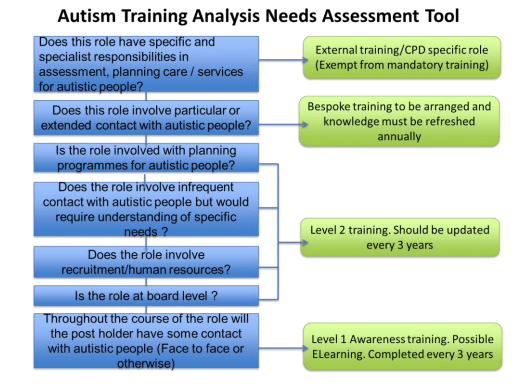The Welsh Government has issued a Code of Practice on the Delivery of Autism Services (CoP) and accompanying supporting guidance (the Guidance). The CoP will be implemented from September 2021 and importantly applies to all age groups.
It is aimed at:
- autistic people, including those with other co-existing conditions
- providers of social care and health support for autistic people and their families and/or carers
- practitioners in social care and health who work with autistic people and their families and/or carers
- commissioners and people with a strategic role in assessing and planning local services for autistic people and their families and/or carers
- practitioners in other related services providing support for autistic people and their families and/or carers, for example employment, education and criminal justice
- service providers and practitioners providing services for autistic people with co-existing conditions.
It is a statutory CoP and although it draws heavily on existing legislation, such as the Social Services and Wellbeing Act (2014), the Additional Learning Needs and Educational Tribunal Act (2018) and the Equality Act (2010), it does introduce some new duties and responsibilities on public bodies and local authorities, national health boards and NHS trusts who must act in accordance with the requirements contained in the CoP and they must also have regard to any guidelines set out in the CoP and its accompanying guidance.
For example, when carrying out social care needs assessments local authorities must now:
- Ensure that IQ is not considered as part of the eligibility criteria.
- Ensure that practitioners assessing an autistic individual’s eligibility for social care services have sufficient knowledge and skills to understand the impact of autism on the individual’s ability to achieve the five elements of well-being without care and support.
The Guidance (page 32) emphasises that:
It is essential that social care assessors understand the needs of autistic people, so they are able to provide the most appropriate advice and support to individuals, parents and carers.
All practitioners undertaking assessments must be suitably skilled, trained and qualified in undertaking assessments… Appropriate levels of qualification for undertaking these activities include:
- either a registered social work or social care practitioner holding a professional qualification at level 5 or above;
- or a person holding a social care qualification at level 4 or above, which includes knowledge and skills undertaking person centred assessment, under the supervision of a registered social work or social care practitioner.
Additionally, to meet suitably skilled practitioners should have appropriate understanding and training in autism and related behaviour support.
and
When carrying out an assessment, a local authority must consider whether the nature of the person’s needs calls for the involvement of a person who has specialist skills, knowledge or expertise. If the local authority decides that such involvement is called for, it must either consult with a person who it considers will be able to provide those skills or that knowledge or expertise or arrange for the assessment to be carried out by a person with the required specialist skills, knowledge or expertise. (page 61)
Another welcome requirement is that public bodies will be expected to undertake autism training needs analysis for all their staff, tailored to their professional needs. Local authorities, local health boards and NHS trusts must ensure that those (including volunteers) working in health and social care have specific autism awareness training. For individuals where this is needed to fulfil their role responsibilities and for those who wish to develop their knowledge of autism, there should be access to different levels of specialist learning and development.
The Guidance (page 56) introduces a tool to help managers evaluate the different roles within their department and determine the level of training appropriate to the role.

The Guidance (page 59) goes on to state:
Best Practice would suggest the following should undertake training in autism;
- Teachers – the new curriculum inset days – linked to whole school approach, equality training;
- Those doing care and support assessments;
- General Practitioners – they should be the gateway into services. As a minimum they should know how the pathway works in their area;
- Mental health – children and adults;
- Substance misuse teams;
- Learning Disability Teams;
- Frontline Staff;
- Consortia;
- Local authorities – e.g. armed forces and domestic abuse training has been rolled out to all staff;
- Nurses;
- Dentists;
- Paramedics;
- Leisure service personnel.
In addition, the Guidance usefully restates the Welsh Government’s expectations regarding the carrying out of a carer’s assessment:
Local authorities must ensure that there is a named individual whose function is to co-ordinate and facilitate or carry out the assessment. There must be a written record of the assessment and a copy given to the carer. If the assessment involves a meeting, it should be carried out in a convenient and private place. Assessments can be over the phone or online but this should only happen if the carer agrees. Some local authorities carry out a supported self-assessment. This involves the carer filling in a self-assessment questionnaire, and then being contacted by the local authority to discuss what has been submitted. In some areas, local organisations carry out the assessments on behalf of the local authority but arrangements should still be made through the local authority and an explanation offered to the carer regarding who will carry out the assessment. In these instances, it is essential that the local authorities ensure that the social care assessors understand the needs of autistic people, so they are able to provide the most appropriate advice and support to parents and carers. Not all carers will need an assessment and this needs to be clear, especially to referrers. Carers also need to be aware of the assessment and the services available and the eligibility to access.
Outcomes from assessments may not always include offering services but may mean signposting for training or further information to offer support and increase confidence to undertake the role.
If the autistic person receives an assessment in their own right and for their own needs the local authority can combine the assessment of the carer so that they are linked and complementary but this should only be done with the carer’s permission. The assessors must not assume that the carer can and is able and willing to meet any caring needs.
Carers do not need to be providing ‘regular and substantial’ care to be entitled to a carer’s needs assessment. Carers of all ages are able to receive a carer’s assessment.
The assessment should include offering information and advice, training, emotional support or a short break.
The assessment should disclose:
- what the outcomes are for the carer
- whether the carer is able and willing to continue in the caring role
- how the carer can balance caring with other aspects of day-to-day life
- whether the carer wishes to work or continue to work
- whether the carer wants to participate in education, training or leisure activities










read this reality is a lot of this will not be what is stated above a lot of autistic people and their carers will tell you adult services GP nd local authorities offer very little or what is offered is not what you ask for or there is a long waiting list to access anything offered also the cost of some services makes it a question if you can afford to access the service on offer